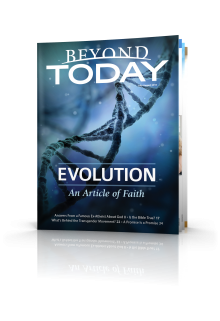
Other Biblical information on our site

|
Audio/Video
|
|
|
Jesus observed the Passover, the Feast of Tabernacles and the other festivals that God gave to Israel. Should you follow His example? Are those sacred festivals still applicable for Christians?
Many Bible readers are surprised to learn that Christ observed the festivals God revealed through Moses, while other religious holidays are nowhere to be found in the Bible. One reason Christ observed those festivals is that they are relevant to His message, the gospel of the Kindgom of God. By observing them we can learn much about God's plan to grant eternal life to those who become His sons and daughters through Jesus Christ. This is what gives these festivals their Christian importance and significance.
The annual cycle of God's Holy Days reminds us that God is working according to His plan of offering eternal life to every human being who has ever lived. Each year, celebrating the Holy Days once again refreshes in our minds the steps in that plan and gives great purpose to our daily lives.
|
|
2021 |
2022 |
2023 |
2024 |
2025 |
2026 |
2027 |
|
| Passover | Mar 27 | Apr 15 | Apr 5 | Apr 22 | Apr 12 | Apr 1 | Apr 21 |
| Feast of Unleavened Bread | Mar 28 - Apr 3 | Apr 16-22 | Apr 6-12 | Apr 23-29 | Apr 13-19 | Apr 2-8 | Apr 22-28 |
| Pentecost | May 16 | June 5 | May 28 | June 16 | June 1 | May 24 | June 13 |
| Feast of Trumpets | Sep 7 | Sep 26 | Sep 16 | Oct 3 | Sep 23 | Sep 12 | Oct 2 |
| Day of Atonement | Sep 16 | Oct 5 | Sep 25 | Oct 12 | Oct 2 | Sep 21 | Oct 11 |
| Feast of Tabernacles | Sep 21-27 | Oct 10-16 | Sep 30 - Oct 6 | Oct 17-23 | Oct 7-13 | Sep 26-Oct 2 | Oct 16-22 |
| Eighth Day | Sep 28 | Oct 17 | Oct 7 | Oct 24 | Oct 14 | Oct 3 | Oct 23 |
Copyright © 1997-2019 Church of God - Twin Cities.
All rights reserved. Please send comments/changes to: webmaster@churchofgodtwincities.org
Other Biblical information on our site:
Key Subjects Index
General Topics Index
Biblical References Index
Home Page of this site